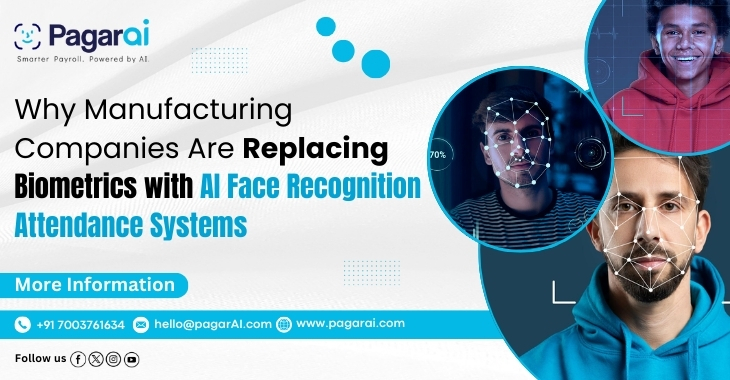For years, biometric fingerprint scanners were the go-to technology for secure attendance tracking in manufacturing. They were a step up from punch cards and manual registers — but in 2025, they’re no longer enough.
Factories are moving toward AI-powered face recognition attendance systems because they are:
- Faster
- Contactless
- More secure
- Better integrated with workforce analytics
When combined with AI attendance management systems and AI employee monitoring tools, AI face recognition becomes a complete workforce control and optimization solution.
1. The Limitations of Fingerprint Biometrics in Manufacturing
a. Hygiene Concerns
In factories — especially food processing — touching the same scanner increases contamination risks.
b. Wear & Tear
Dust, oil, grease, and gloves interfere with fingerprint scanning.
c. Slow Throughput
During shift changes, fingerprint queues slow down entry.
d. Spoofing Risks
Stored impressions or replicas can still be misused in some systems.
2. Why AI Face Recognition is the Next Step
a. True Contactless Check-in
Workers don’t have to touch any surface, improving hygiene and speed.
b. Recognition Through PPE
Advanced AI identifies workers even with helmets, masks, or safety goggles.
c. Speed & Efficiency
Under 1-second verification keeps shift changes smooth, even for hundreds of workers.
d. Fraud Prevention
Liveness detection ensures only real, present employees check in — eliminating buddy punching.
3. Integration with Factory Attendance Management
Face recognition systems can:
- Instantly sync data to AI attendance management dashboards
- Send late-arrival alerts to supervisors
- Auto-adjust payroll for overtime or shift differentials
When connected to AI productivity trackers, it’s possible to match attendance with real production output.
4. Cost Savings for Manufacturing Companies
Switching to AI face recognition can reduce:
- Overtime fraud → Accurate shift tracking means no overpayment.
- Downtime → Faster check-ins keep production on schedule.
- Maintenance costs → No moving scanner parts to repair.
5. Worker Safety & Compliance Benefits
- Access control ensures only authorized, trained workers enter restricted areas.
- Systems can verify PPE compliance before granting entry.
- Logs provide proof of compliance for labor and safety audits.
6. Real-World Example
A large textile factory replaced fingerprint scanners with AI face recognition attendance machines at all gates.
In 6 months:
- Reduced average check-in time by 60%
- Eliminated buddy punching completely
- Improved hygiene compliance across all plants
7. The Future: AI Face Recognition + IoT in Manufacturing
- Machines will power on automatically when a worker’s check-in is verified.
- Safety systems will alert supervisors if a worker in the wrong shift enters a restricted zone.
- Predictive scheduling will assign shifts based on worker attendance and performance history.
Conclusion: The Upgrade Manufacturing Needs Now
Fingerprint scanners served their time — but in modern factories, speed, accuracy, hygiene, and security demand more.
By replacing old biometric systems with AI-powered face recognition attendance integrated into AI attendance management systems and AI productivity trackers, manufacturing companies can:
- Save money
- Improve safety
- Boost productivity
- Eliminate fraud
The future of factory attendance is face-first, AI-driven, and fully automated.




